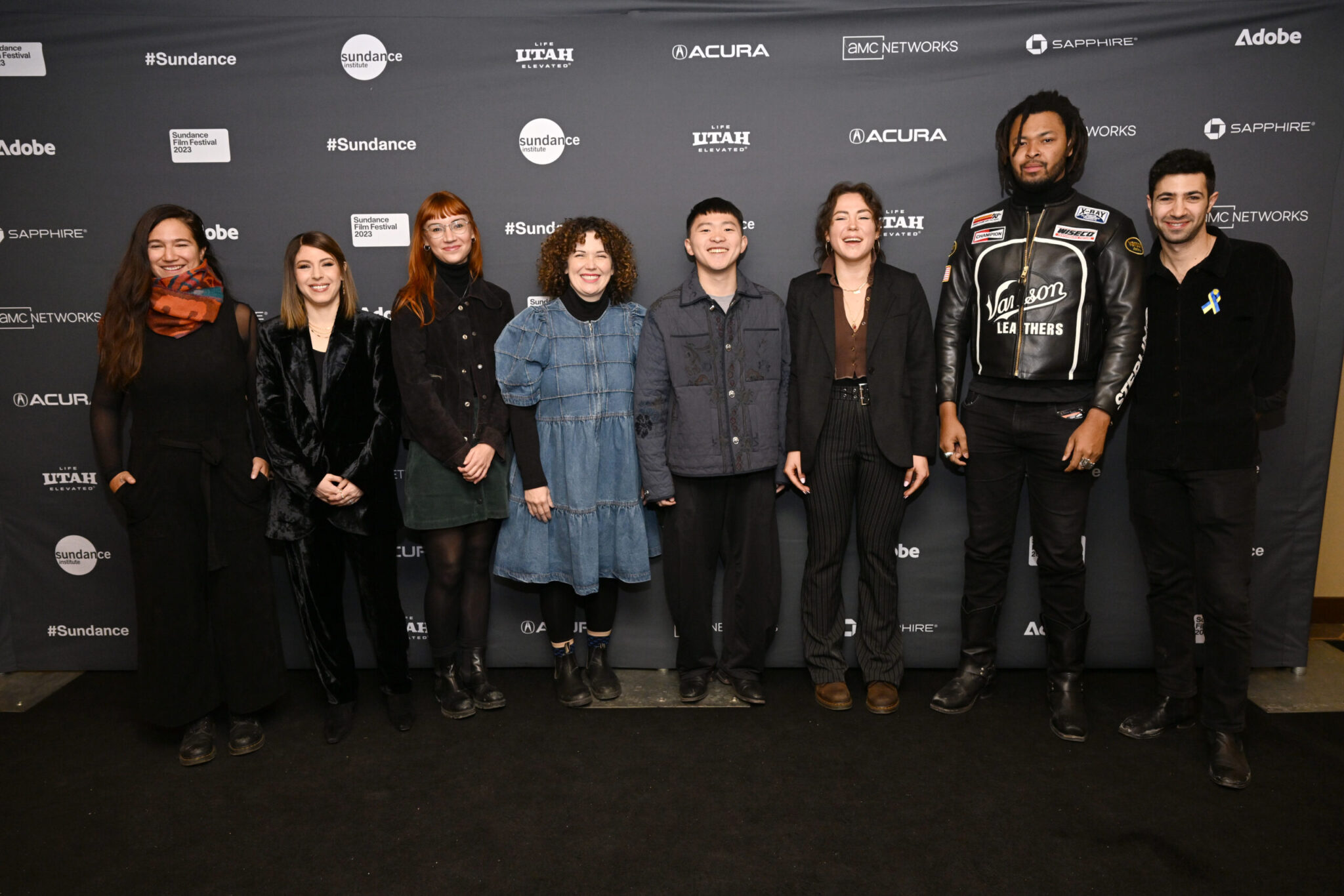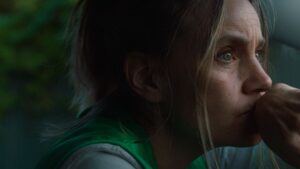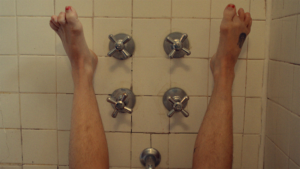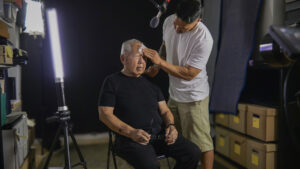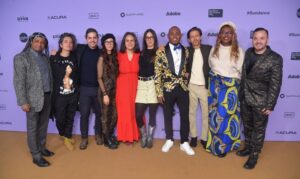PARK CITY, UTAH – JANUARY 22: (L-R) Filmmakers Lucia Flórez, Paula Eiselt, Meredith Moore, Lisa Ogdie, Shuli Huang, Tara O’Callaghan, Sterling Hampton and Daniel Lombroso attend the 2023 Sundance Film Festival Documentary Short Film Program at Prospector Square Theatre on January 22, 2023 in Park City, Utah. (Photo by Jim Bennett/Getty Images)
By Peter Jones
Nonfiction stories about everything from an online sex worker to the war in Ukraine were part of the Documentary Short Film Program of the 2023 Sundance Film Festival. A Q&A with all the filmmakers followed the screenings.
Jonna McKone’s experimental Margie Soudek’s Salt and Pepper Shakers is effectively a documentary about itself as the filmmaker tests out the latest in special effects in an odd but loving portrait of her aging grandmother and her eclectic assortment of salt and pepper shakers.
“What’s this movie about?” a bewildered Margie asks her granddaughter at one point.
It’s a good question. The film works as both a tender novelty and a modest push on the boundaries of documentary cinema.
As Mrs. Soudek gives a tour of her collection of shakers celebrating outhouses, skulls, hamburgers, breasts, and the Model T, McKone plays around with new computerized effects. Margie takes her walker for a stroll — and boom, an explosion!
The unusual approach was essentially the product of multitasking.
“I knew I had to document my grandmother’s salt and pepper shaker collection,” McKone says. “And then I sort of set the footage aside. I also started teaching special effects, and slowly the footage made its way into the demos.”
The black-and-white film Kylie juxtaposes a ballet dancer’s beauty to the irony of her inner-city Los Angeles neighborhood. As the dancer of the film’s title pliés in a desolate parking lot, Kylie Jefferson, in a voiceover, talks about what she says is the perfection expected of women in the Black community.
“You can’t have ugly feet,” she explains.
“All the creative decisions were kind of made on the fly. … We made something that felt good,” director Sterling Hampton says of the project.
The overall experience was a revelation for Jefferson.
“I was realizing my experience over the last few years was actually something that was worth a story,” she says. “It really didn’t come together for me until seeing the short film. I was like, ‘Dang girl. You have a concept, honey.’”
The 2022 overturning of Roe vs. Wade was the impetus for Under G-d, a look at how religious groups — Jewish leaders working with Muslims, Buddhists, and Christians — are using faith as an instrument to support abortion rights. A mother, for example, talks about how her choice to terminate a fetus with a life-threatening chromosomal abnormality was based on Jewish teachings.
Director Paula Eiselt says the film was an opportunity to put her recent despair into action.
“A moment of deep hope was that the lawsuits we were following in the film … work, that this strategy can block abortion bans in states,” she says.
Rabbi Barry Silver, who is profiled in Under G-d, says the film’s message is clear.
“A religion should bring bridges of understanding, not walls of separation, and no government has the right to impose one religion on everyone else,” he says.
Tolerance of another kind is explored in Will You Look at Me as gay filmmaker Shuli Huang returns to China and winds up confronting his lack of acceptance by his conservative family.
“During the Chinese Spring Fest of 2021, my mother and I had an unexpected conversation after seven years of being apart,” Huang says. “During that conversation, for the first time in many years, we looked at each other.”
The director recorded audio of a difficult discussion that revealed years of a mother’s shame and disappointment within a culture where “face” and tradition mean everything.
Huang juxtaposes the difficult back and forth with old Super 8 home movies of happier times when a mother’s love for her young son was clearly strong and unconditional.
“I gave birth to a monster,” the mother blurts out hurtfully, but also often blames herself for somehow leading her son into a life she doesn’t understand.
“I didn’t have the visual image for the conversation,” the director says of the project’s format. “After putting together a rough cut, the film just came into its own shape naturally.”
The New Yorker–produced Liturgy of Anti-Tank Obstacles finds Ukrainian sculptors of religious statues using their skills to construct the defensive objects of the film’s title. American producer Daniel Lombroso worked with Ukrainian director Dmytro Sukholytkyy-Sobchuk, who was not in attendance, having been unable to obtain a visa.
“He pitched us this vision that’s so unlike all the visions we see on our phones,” Lombroso says. “It’s really kind of about the everyday reality that sculptors are now making anti-tank weapons, and filmmakers are now fighting the war effort in their own way… The cross these people were making, religious statues, if you turn it on its side, is an anti-tank obstacle.”
The religious symbolism is as compelling as it is ironic.
“Dmytro is an atheist, I’m Jewish, and we made a really Christian movie,” the producer says. “The style was intricate to it. We wanted to make a war film without showing war.”
Shirampari: Legacies of the River is a simple cinema verité about an Indigenous father passing on the traditional skills of hunting catfish in the Peruvian Amazon to his young son. Director Lucia Florez says the impetus was simply her director of photography taking a trip to Peru.
“He saw this man coming out of the river with this huge catfish, and he was like, ‘How did he catch that?’ He became obsessed with the idea,” Florez says.
The film is also a study of how even modest technology is slowly changing a way of life, even in the depths of the Amazon rainforest, as an old man complains that motorboats are the way of a “lazy” fisherman. The father and son don’t use one.
From another end of the planet, Call Me Mommy profiles an Irish single mother who diligently supports her family as an online sex worker. The film follows middle-aged Sinéad as she does the laundry, cares for four children and her bipolar mother, and graphically acts out sexual fantasies for men in paid video chats.
“A mother’s love is a blessing,” Sinéad’s voiceover says when she first appears on screen with all the look and pomp of a superhero.
“Online sex was kind of exploding in Ireland, so I started traveling around interviewing women and that kind of brought me to Sinéad and her story,” director Tara O’Callaghan says. “We had such a raw and real story. It was important for us to portray it that way.”
Sinéad says the film went through an evolution of sorts.
“It was interesting that it started out in one way and ended up turning into something so much more — about my own mother, about how I ‘mother’ other people in the industry, and it just came together as a fantastic story,” she says.




